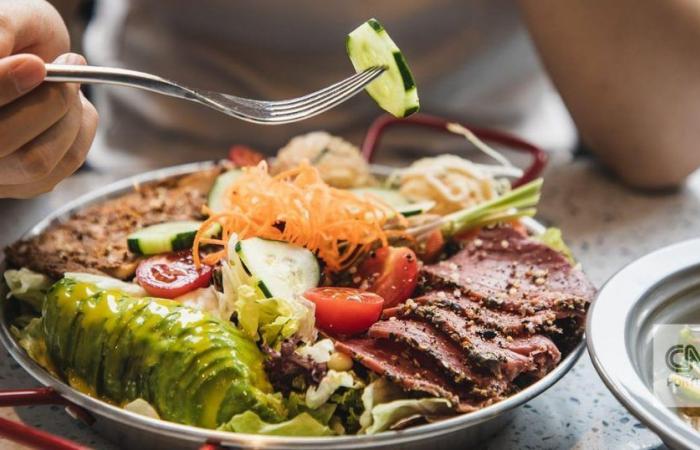Focusing on healthy eating seems like a good thing, right? Not always
Jason Wood was on vacation, sitting in a restaurant with his husband, angry and upset that he couldn’t swap the pita bread for fresh vegetables in his hummus dish.
The distress was not exaggerated, Wood said. There were 20 years of eating disorder and the anxiety and stress associated with it culminated in a single moment, he said.
Wood suffers from orthorexia, an eating disorder that is not included in the Diagnostic and Statistical Manual of Mental Disorders, also called the DSM, the formal guide for the clinical assessment of mental illnesses. But doctors are seeing an increase in orthorexia among patients, said therapist Jennifer Rollin, founder of the Eating Disorders Center in Rockville, Maryland, in the United States.
“My hope is that it will be added to the DSM, but unfortunately it seems to be a very slow process to get it included,” lamented Rollin.
Orthorexia is an obsession with the quality and purity of food — the so-called clean eating (clean eating), defined by a set of rules that depend on certain individuals and the context in which they live, explained Jennifer Gaudiani, eating disorders doctor and founder and medical director of the Gaudiani Clinic in Denver. A November 2023 study found that approximately three in 10 participants showed signs of orthorexia.
The disease is often ignored or underestimated because it is so focused on healthy eating, noted Wood, director of community engagement for the National Association of Anorexia Nervosa and Associated Disorders (ANAD).
A lack of knowledge about the disease prevented Wood’s friends and family from voicing their concerns – sometimes even applauding his efforts to follow strict dietary principles – even as he withdrew from his friends and lost so much weight that he was no longer able to keep it off. body temperature.
Here’s what you need to know about orthorexia.
Diet culture in disguise
Focusing on healthy eating seems like a good thing, right? Not always.
Eating disorders often have a similar basis: a genetic predisposition combined with environmental factors, Rollin said. And often, the disruption centers on a rigid set of rules, whether it’s calories, when to eat or food ingredients, he added.
When people vulnerable to eating disorders cling to the fact that they only eat in a way they consider healthy, the behavior can turn from a preference to an obsession, Rollin explained.
Over the years, Wood said his list of unhealthy foods grew and those considered healthy became smaller until he stopped going to parties because he couldn’t find anything he could eat, which left him with a lot of anxiety.
For some people with orthorexia, but not all, their body image may begin to depend on strictly following their dietary rules, Rollin noted.
And with similar bases, orthorexia can transform into other disorders, such as bulimia or anorexia nervosa, according to the specialist.
The motivations that people with orthorexia may have, as well as the applause they receive from society, may be labeled as health promotion or disease prevention, but they are often substitutes for a “pure, old-fashioned diet culture” that prioritizes an ideal body shape and size, Gaudiani clarified.
“Some elements can be a lot like diet culture in disguise,” Rollin argued.
And even if there is no weight shame, orthorexia and the steps a person takes to comply with certain dietary rules can be costly, distracting and distressing, Gaudiani said.
“It can also limit us in terms of what our highest goals and values are,” he added.
After all, what is healthy?
Another sign that dietary rules are not just about health is the difficulty in defining what is healthy.
In the 1990s, clean, healthy eating consisted of low-fat diets, Gaudiani recalled. Nowadays, people are more likely to consider foods rich in protein and fat, but low in carbohydrates and sugar, to be healthy.
Others would prioritize the origin of the food – for example, whether it is organic, non-GMO and local.
Of course, it’s not wrong to want to eat a salad, Rollin noted, but the problem comes when you think you can only eat a salad.
Each person is unique, so the healthiest food choice at a given time will depend on the needs of each individual and the context in which they find themselves. Unless it’s necessary to eat a certain way due to a health problem, often the best course of action is to listen to your body, Rollin said.
And when thinking about health, it’s important not to just think about nutrition.
A healthy life includes rich social relationships, time spent pursuing passions, enjoyable physical activity, and enough brain space to find peace—all of which are hard to find when you spend hours a day pondering what you “should” eat.
“If you are someone who just wants to live a reasonably balanced, social and connected life, the rules of orthorexia can isolate you from your peers, because you end up turning down opportunities to eat with other people because they don’t follow the same rules,” Gaudiani highlighted. . So if we say “no,” our social world can collapse and become quite small.”
Recover and live life
If you or a loved one needs help treating orthorexia, the good news is that treatment follows a similar path to plans established for eating disorders such as anorexia or bulimia nervosa. The bad news is that a lack of public awareness can present obstacles.
When seeking therapy, look not only for an eating disorder specialist but also one with experience in orthorexia, Rollin advised. Not all experts have this experience.
People with orthorexia can find a team that includes therapists and dieticians, similar to patients being treated for other eating disorders. But people living with orthorexia will also likely face the added layer of unraveling their definition of health and reframing their ideas around it in a challenging way.
The process can also involve working with the people around you, Rollin further pointed out. More and more people are realizing that it’s not a good idea to regularly talk about food in terms of weight, but fewer and fewer people find it problematic to talk about “healthy” or “unhealthy” foods, he said.
“You may need to educate friends and family to help them understand and have compassion about why comments about the new detox juice you are making are reactive to them,” he said.
And those in recovery should also have compassion for themselves, Gaudiani said.
“Nobody does this just for fun or to accidentally end up in trouble. They start doing it because they feel like it benefits their health, or because they feel like there’s social pressure, or because they feel like what they’re doing is safe.”
The recovery process can be difficult, but it is rewarding, Wood said. It’s been almost four years since she realized she’d hit rock bottom at that holiday dinner.
“I feel like I’m starting to live my life again. I’m able to apply all the time I used to spend thinking about food to other aspects of my life. And that’s been really good.”
Tags: Orthorexia eating disorder encourage
--





